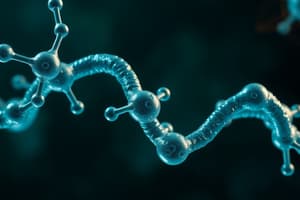Podcast
Questions and Answers
What is biochemistry?
What is biochemistry?
The study of biology at a molecular level.
Which of the following are biological molecules that need to be known?
Which of the following are biological molecules that need to be known?
- Proteins (correct)
- Carbohydrates (correct)
- Photosynthesis
- Nucleic Acids (correct)
What are carbohydrates used for?
What are carbohydrates used for?
For energy and sometimes structural purposes.
What are lipids used for?
What are lipids used for?
What are proteins responsible for?
What are proteins responsible for?
What is the role of water in biochemical reactions?
What is the role of water in biochemical reactions?
What are nucleic acids responsible for?
What are nucleic acids responsible for?
What is the function of enzymes?
What is the function of enzymes?
What is a covalent bond?
What is a covalent bond?
Carbon can form two covalent bonds.
Carbon can form two covalent bonds.
What are double bonds?
What are double bonds?
Flashcards are hidden until you start studying
Study Notes
Introduction to Biochemistry
- Biochemistry explores biology at the molecular level, emphasizing the significance of chemical molecules in biological processes.
- Key focuses include understanding the relationships between structure and function of biomolecules.
Biological Molecules
-
Carbohydrates
- Vital for life, used for energy storage and supply.
- Structurally important in forms such as cellulose.
-
Lipids
- Include fats, oils, cholesterol, and steroids.
- Role in cellular membranes, insulation, protection, and as a minor energy source.
-
Proteins
- Serve various functions including transport and structural roles.
- Constitutive of enzymes, hormones, antibodies, and haemoglobin.
-
Water
- Essential for life, involved in metabolic reactions.
- Key structural component in plants and a critical part of animal diets.
-
Nucleic Acids
- Responsible for DNA and RNA formation, consisting of nucleotides.
-
Enzymes
- Specialized proteins that catalyze metabolic reactions across living organisms.
Chemistry Basics
- Focus on organic chemistry, where most biomolecules are carbon-based (excluding water, which is H2O).
- Understanding chemical bonding is crucial for grasping the stability and function of biomolecules.
Chemical Bonds
-
Covalent Bonds
- Formed when atoms share electrons, stabilizing the atom.
- Carbon can form four covalent bonds due to having four outer electrons.
-
Double Bonds
- Atoms can share multiple electrons to stabilize themselves.
- Common examples include carbon-carbon (C=C) and carbon-oxygen (C=O) double bonds.
Studying That Suits You
Use AI to generate personalized quizzes and flashcards to suit your learning preferences.



